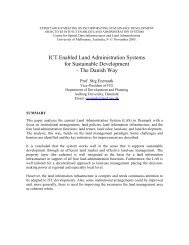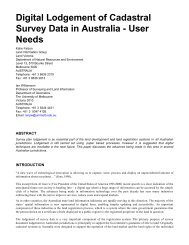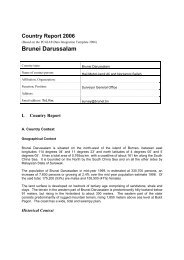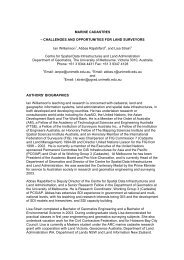A Local-State Government Spatial Data Sharing Partnership
A Local-State Government Spatial Data Sharing Partnership
A Local-State Government Spatial Data Sharing Partnership
Create successful ePaper yourself
Turn your PDF publications into a flip-book with our unique Google optimized e-Paper software.
51<br />
Chapter 2 – <strong>Spatial</strong> <strong>Data</strong> and SDI in Context<br />
2.5.6 Status of Empirical Research on <strong>Spatial</strong> <strong>Data</strong> <strong>Sharing</strong> and SDI<br />
Much of the research on data sharing and SDI development has been theoretical based but<br />
has provided limited empirical evidence on the importance or otherwise of the various<br />
factors that impact on the success of data sharing initiatives. Table 2.6 below summarises<br />
the outcomes from a range of empirical research on data sharing and SDI development.<br />
The table identifies both the concepts examined in each research study and the key<br />
findings from the empirical analysis.<br />
Table 2.6 Summary of empirical research findings for data sharing and SDI development<br />
Author Concepts Examined Key findings<br />
(Nedovic-Budic &<br />
Pinto 2000)<br />
(Harvey & Tulloch<br />
2006)<br />
(Nedovic-Budic et<br />
al. 2004a)<br />
(Tulloch & Fuld<br />
2001)<br />
(Crompvoets et<br />
al. 2004)<br />
Information sharing in an interorganisational<br />
environment. Utilised case<br />
study approach to examine context,<br />
structure, process/issues and outcomes of<br />
data sharing.<br />
Evaluation of foundations of SDI through<br />
local government data sharing by<br />
comparing data sharing processes, issues<br />
and practices across five domains.<br />
Examined the properties of data sharing<br />
and motivations for cooperative<br />
arrangements.<br />
Investigation of framework data for building<br />
the NSDI, particularly the production at<br />
local government level.<br />
Assessed world-wide development of<br />
national spatial data clearinghouses.<br />
Empirical observation of developments of<br />
clearinghouse implementation, growth,<br />
usage, data sets, people, policy and<br />
standards.<br />
Coordination and implementation issues<br />
including attitude, responsibilities, perception<br />
of fairness (trust), commitment, teamwork,<br />
negotiation process and persistence were<br />
identified as critical. High data dependence<br />
is conducive to a good fit but requires<br />
organisational change, management support<br />
and funding.<br />
Symbiotic relationship between local and<br />
state government must be better understood.<br />
Policy development must reflect the business<br />
needs of local government. Trust and<br />
individual attitudes are important. SDI<br />
development at local level is inconsistent<br />
and not well understood.<br />
Organisations collaborate for different<br />
reasons but for common missions or goals.<br />
Resources are a strong motivator for<br />
external interactions but standards adoption<br />
is still limited. Formal mechanisms<br />
(contracts) predominate through policies and<br />
mutual rules. Clearinghouse development is<br />
more likely to only internal. Internet is<br />
becoming a growing facilitator for<br />
communications and relations<br />
Low level of active or sophisticated data<br />
sharing was reported. Growing importance<br />
of internet for clearinghouses is identified.<br />
Inter-organisational issues continue to be<br />
major challenge. Benefits of sharing include<br />
efficiency, effectiveness and equity. Less<br />
structured chaordic approaches have<br />
potential but not proven. Jurisdictional<br />
coordination variation at state level including<br />
political, legal, economic and governance<br />
arrangements create challenges for NSDI.<br />
The methodology of the survey approach<br />
provided objective results. Decline in<br />
clearinghouse activity reflect resourcing<br />
issues and greater demand on application<br />
services. Key success factors were stable<br />
funding, web services, clarity of purpose,<br />
good communication channels, user friendly<br />
access and trust.<br />
Many of these findings agree with the previously reviewed theoretical literature on data<br />
sharing and SDI development. Factors and issues that appear to re-occur include the<br />
growing importance of the internet connectivity, resourcing, trust and institutional<br />
frameworks, particularly policy.







